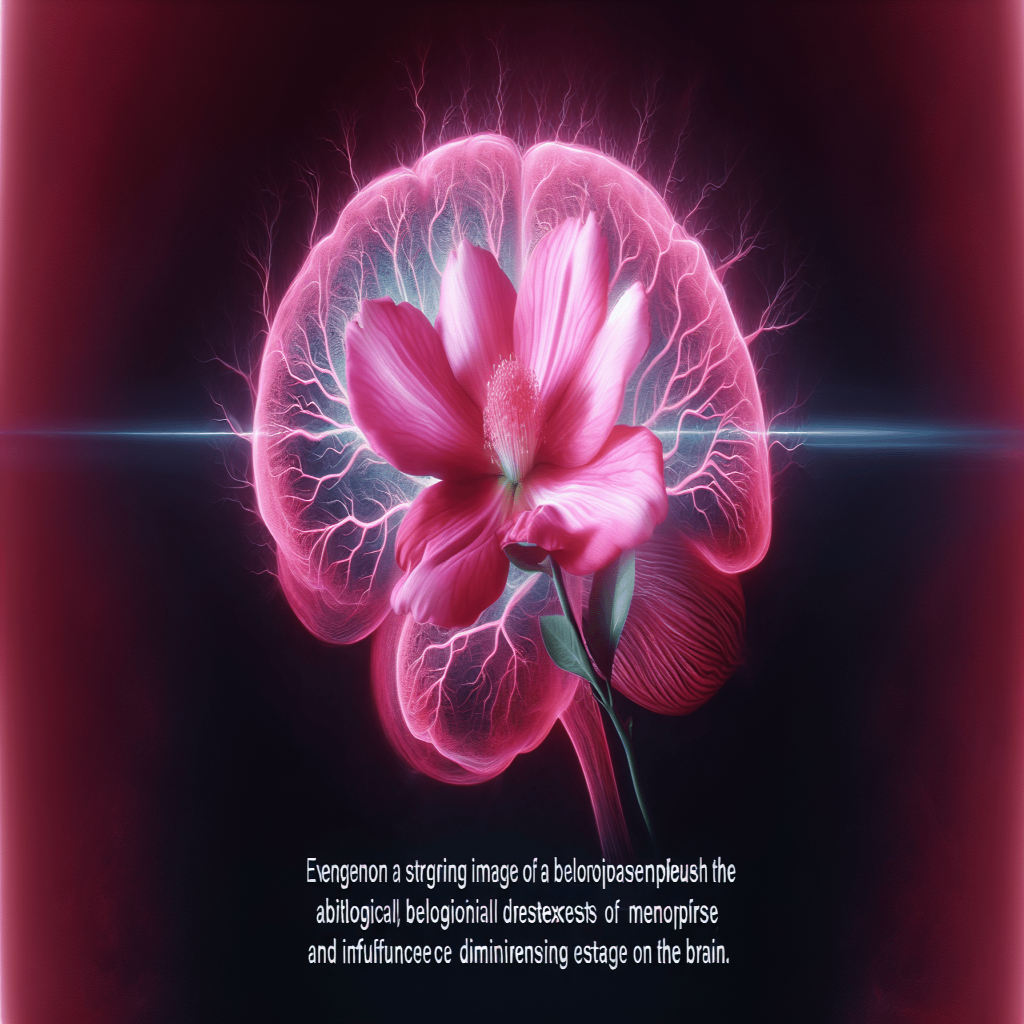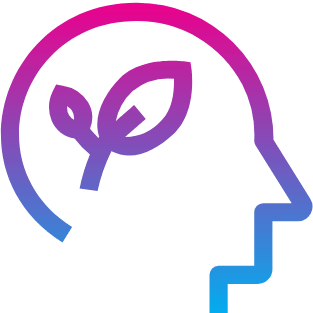You may have heard that menopause is caused by declining estrogen levels, but did you know that this decline happens rapidly inside your brain? Understanding the impact of estrogen decline in the brain during menopause is crucial for managing symptoms and addressing the root cause. Estrogen is often seen as just a “female sex hormone,” but it plays a much larger role in the body. It regulates the menstrual cycle, is essential for reproduction, and even maintains bone density. After 40, estrogen levels start to plummet, and traditional treatments may not be effective for everyone. Recent studies have shown that the brain loses the most amount of estrogen, which highlights the importance of preventing early menopause and finding the right solutions.

Understanding the Impact of Estrogen Decline in the Brain during Menopause
Menopause is a natural phase of a woman’s life that marks the end of her reproductive years. While it is commonly known that menopause is caused by a decline in estrogen levels, what many people overlook is the rapid decline of estrogen that occurs inside the brain. This article aims to provide a comprehensive understanding of the impact of estrogen decline in the brain during menopause and how it affects women’s overall health and well-being.
Definition of estrogen as a hormone present in both women and men
Estrogen is often referred to as the “female sex hormone,” but it is important to note that it is present in both women and men. Estrogen plays a crucial role in various bodily functions, including regulating the menstrual cycle and supporting reproductive health. While menopause is commonly associated with women, men also experience a decline in estrogen levels as they age.
Role of estrogen in regulating the menstrual cycle and reproduction
In women, estrogen plays a pivotal role in regulating the menstrual cycle and supporting reproductive health. It is responsible for the development and maturation of eggs in the ovaries and the thickening of the uterine lining in preparation for pregnancy. Estrogen also helps maintain the health of the reproductive organs, such as the uterus and breasts.
Impact of estrogen decline on fertility and inability to have children
One of the significant consequences of estrogen decline during menopause is the loss of fertility. As estrogen levels decline, the ovaries become less responsive, leading to a decrease in the production and release of eggs. This decline in fertility is a natural part of the aging process and marks the end of a woman’s ability to conceive naturally.
Effect of estrogen decline on bone density and joint discomfort
Estrogen plays a crucial role in maintaining bone density. As estrogen levels decline during menopause, women may experience a significant decrease in bone density, leading to a condition called osteoporosis. Osteoporosis makes the bones more fragile and susceptible to fractures. In addition to bone health, estrogen decline can also contribute to joint discomfort, making daily activities challenging for some women.
Estrogen as the body’s master conductor of hormone production
Estrogen is often referred to as the body’s master conductor because it plays a vital role in regulating the production of other hormones, growth factors, and metabolic factors. It helps maintain a delicate balance in the body, ensuring that various bodily functions are functioning optimally.
Nosedive of estrogen levels after 40
Estrogen levels start to decline after the age of 40, marking the beginning of perimenopause, the transitional phase leading up to menopause. During this time, estrogen production begins to fluctuate, leading to irregular menstrual cycles and various menopausal symptoms.
Reasons why traditional treatments for menopause symptoms may not work for everyone
Traditional treatments for menopause symptoms, such as hormone replacement therapy (HRT), may not work for everyone due to individual variations in hormone levels and responses. Hormone levels can vary significantly among women, making it challenging to find a one-size-fits-all approach to menopause management. Additionally, some women may have contraindications or concerns about the potential risks and side effects of HRT, leading them to explore alternative treatment options.
Discovery of the specific part of the body with the most significant estrogen loss
Extensive research in the field of menopause has revealed that the brain is the part of the body that experiences the most significant decline in estrogen levels. This discovery has shed light on the neurological impact of estrogen decline and its influence on menopausal symptoms.
The brain as the primary site of estrogen decline during menopause
During menopause, the brain becomes the primary site of estrogen decline. Estrogen plays a crucial role in maintaining the health and function of the brain, including regulating mood, cognition, and memory. The decrease in estrogen levels can lead to various neurological symptoms, including mood swings, memory problems, and cognitive decline.
Understanding How Estrogen Triggers Menopause Symptoms
The relationship between estrogen and menopause symptoms
The decline in estrogen levels during menopause is closely associated with the onset of menopausal symptoms. Estrogen plays a significant role in maintaining the delicate balance of various bodily functions, and its decline can disrupt this balance, leading to a range of symptoms.
Explanation of the mechanisms by which estrogen triggers symptoms
Estrogen affects the body through its interaction with estrogen receptors, which are present throughout the body, including the brain, reproductive organs, and other tissues. When estrogen levels decline, the signaling between estrogen receptors is disrupted, leading to various physiological and psychological changes.
Common symptoms of menopause affected by estrogen decline
Menopause symptoms can vary greatly among women, but some of the most common symptoms associated with estrogen decline include hot flashes, night sweats, vaginal dryness, mood swings, memory problems, and sleep disturbances. These symptoms can significantly impact a woman’s quality of life and overall well-being.
Physical symptoms such as hot flashes, night sweats, and vaginal dryness
Hot flashes and night sweats are perhaps the most well-known and characteristic symptoms of menopause. These sudden, intense feelings of heat can cause flushing, sweating, and discomfort, often leading to disrupted sleep patterns. Vaginal dryness is another common physical symptom caused by estrogen decline, leading to discomfort, pain, and an increased risk of urinary tract infections.
Emotional and cognitive symptoms such as mood swings and memory problems
In addition to physical symptoms, menopause can also have a significant impact on a woman’s emotional well-being and cognitive function. Many women experience mood swings, irritability, anxiety, and depression during menopause, which can be attributed to hormonal imbalances, including estrogen decline. Memory problems and difficulty concentrating are also commonly reported during this transitional phase.
Impact of estrogen decline on sleep patterns and energy levels
Estrogen decline can disrupt sleep patterns, leading to difficulties falling asleep and staying asleep. Many women experience night sweats, which can further disrupt sleep and leave them feeling exhausted and fatigued. The lack of quality sleep can also contribute to a decrease in energy levels and overall vitality.
The Importance of Addressing Estrogen Reduction in the Brain
Why resolving estrogen reduction in the brain is crucial for managing menopause symptoms
Addressing estrogen reduction in the brain is crucial for managing menopause symptoms because the brain is a central hub for regulating various bodily functions. Estrogen decline in the brain can significantly impact mood, cognition, memory, and overall well-being. By addressing estrogen reduction in the brain, women can potentially alleviate menopause symptoms and improve their quality of life.
Explanation of how addressing estrogen decline in the brain can alleviate symptoms
Addressing estrogen decline in the brain can be done through various approaches, including hormone replacement therapy, lifestyle modifications, and alternative treatments. By restoring estrogen levels in the brain, women may experience improvement in mood, cognition, memory, and overall well-being. These interventions can help alleviate menopausal symptoms and promote better physical and mental health.
Potential benefits of addressing estrogen reduction in the brain
Addressing estrogen reduction in the brain can offer numerous benefits for women experiencing menopause symptoms. It can help improve mood stability, reduce irritability and anxiety, enhance cognitive function and memory, promote better sleep, and increase overall energy levels. By targeting estrogen decline in the brain, women can optimize their brain health and improve their quality of life during menopause.

Preventing Early Menopause
Introduction to early menopause and its potential consequences
While menopause typically occurs between the ages of 45 and 55, some women may experience early menopause, defined as menopause occurring before the age of 40. Early menopause can have significant consequences for a woman’s reproductive health, overall well-being, and quality of life.
Factors that can contribute to early menopause
Several factors can contribute to early menopause, including genetic predisposition, autoimmune disorders, certain medical treatments such as chemotherapy, smoking, and certain underlying conditions. It is essential for women to be aware of these factors and take proactive steps to prevent early menopause whenever possible.
Lifestyle changes and interventions to prevent early menopause
Making certain lifestyle changes and interventions can help prevent or delay the onset of early menopause. These include maintaining a healthy weight, avoiding smoking and excessive alcohol consumption, engaging in regular exercise, managing stress levels, and ensuring a balanced diet rich in nutrients that support hormonal health.
The role of hormone replacement therapy in preventing early menopause
Hormone replacement therapy (HRT) may be an option for women at risk of early menopause to help delay the onset of menopause and preserve reproductive function. HRT involves the use of medications that contain a combination of estrogen and progesterone or estrogen alone to supplement declining hormone levels.
Potential risks and side effects of hormone replacement therapy
While hormone replacement therapy can be beneficial for some women, it is essential to consider the potential risks and side effects before opting for this treatment. These may include an increased risk of certain cancers, blood clots, stroke, and breast tenderness. It is crucial to consult with a healthcare professional to assess individual risks and benefits.
Natural Ways to Support Brain Health during Menopause
Dietary recommendations to support brain health and estrogen balance
Maintaining a healthy diet is crucial for supporting brain health during menopause. Consuming a variety of nutrient-rich foods, including fruits, vegetables, whole grains, lean proteins, and healthy fats, can help support hormone balance and overall brain function. Foods rich in phytoestrogens, such as soy products, flaxseeds, and legumes, may also be beneficial.
The importance of regular exercise for brain health and hormone regulation
Regular exercise has been shown to have numerous benefits for brain health and hormone regulation during menopause. Engaging in aerobic exercise, strength training, and flexibility exercises can help reduce menopause symptoms, improve mood, support bone health, and enhance cognitive function.
Stress management techniques to support brain health during menopause
Stress management techniques, such as meditation, deep breathing exercises, yoga, and mindfulness practices, can help support brain health during menopause. Chronic stress can have a detrimental impact on hormone balance and overall well-being, so finding effective ways to manage and reduce stress is essential.
Supplementation options to support brain health and estrogen levels
Certain supplements may support brain health and estrogen levels during menopause. These may include omega-3 fatty acids, vitamin D, B vitamins, and herbal supplements such as black cohosh and red clover. It is important to consult with a healthcare professional before starting any supplements to ensure safety and effectiveness.
The mind-body connection and its impact on brain health during menopause
The mind-body connection plays a significant role in maintaining brain health during menopause. Engaging in activities that promote relaxation, such as meditation, yoga, and guided imagery, can help reduce stress, promote hormonal balance, and support overall brain health. Integrating mind-body practices into daily life can have a positive impact on managing menopause symptoms.
The Future of Estrogen Replacement Therapies
Overview of current estrogen replacement therapies
Estrogen replacement therapy (ERT) is currently the most common treatment for menopausal symptoms related to estrogen decline. It involves the use of medications that contain estrogen to supplement declining hormone levels. ERT is available in various forms, including pills, patches, creams, and vaginal preparations.
Limitations and potential risks of current estrogen replacement therapies
While estrogen replacement therapies can provide relief from menopausal symptoms for many women, they are not without limitations and potential risks. ERT may increase the risk of certain cancers, blood clots, and stroke, and it may not be suitable for women with specific medical conditions. Regular monitoring and consultation with a healthcare professional are essential for optimizing treatment and managing potential risks.
Emerging research and advancements in estrogen replacement therapies
Advancements in medical research are continuously being made to develop safer and more effective estrogen replacement therapies. Researchers are exploring alternative delivery methods, such as transdermal patches and nasal sprays, as well as investigating new formulations and combinations of hormones to improve treatment outcomes. This ongoing research aims to provide women with more tailored and personalized options for managing estrogen decline during menopause.
Promising alternative treatments and therapies for managing estrogen decline in the brain
In addition to traditional hormone replacement therapies, alternative treatments and therapies are being explored to address estrogen decline in the brain during menopause. These include herbal remedies, acupuncture, lifestyle modifications, and cognitive-behavioral therapy. While more research is needed to understand their effectiveness fully, these alternative approaches offer potential options for women who prefer a more holistic and natural approach to managing menopause symptoms.
Seeking Medical Advice and Support
The importance of consulting a healthcare professional regarding menopause symptoms
When experiencing menopause symptoms, it is crucial to seek medical advice and support from a healthcare professional. A healthcare provider can evaluate symptoms, assess hormone levels, and provide personalized recommendations and treatment options based on individual needs and preferences. Regular monitoring and follow-up visits are also essential for ensuring the most effective and safe management of menopause symptoms.
Available medical treatments and interventions for managing menopause symptoms
There are several medical treatments and interventions available for managing menopause symptoms. These may include hormone replacement therapy, selective estrogen receptor modulators (SERMs), and medications for specific symptom management, such as antidepressants for mood swings and sleep aids for insomnia. A healthcare professional can help determine the most appropriate treatment plan based on individual symptoms and needs.
The role of hormone testing and monitoring in managing estrogen decline
Hormone testing and monitoring play an essential role in managing estrogen decline during menopause. Through blood tests, healthcare professionals can assess hormone levels and tailor treatment strategies accordingly. Regular monitoring can help ensure that hormone levels are optimized and provide insights into the effectiveness of treatment interventions.
Support groups and resources for women experiencing menopause
Support groups and resources can be invaluable for women experiencing menopause. They provide a sense of community, sharing of experiences, and information on coping strategies and available resources. Online platforms, local community centers, and healthcare facilities often offer support groups and educational materials to empower women during this transitional phase.
The Impact of Estrogen Decline on Mental Health
Relationship between estrogen decline and mental health conditions
The decline in estrogen levels during menopause can have a significant impact on mental health. Estrogen plays a crucial role in regulating neurotransmitters and hormones that affect mood, cognition, and emotional well-being. When estrogen levels decline, women may be more prone to experiencing mental health conditions such as depression, anxiety, and mood disorders.
Common mental health challenges during menopause
Depression, anxiety, and mood swings are some of the most common mental health challenges experienced by women during menopause. These challenges can be attributed, in part, to hormonal imbalances and fluctuations in estrogen levels. Women may also experience cognitive difficulties, including memory problems, difficulty concentrating, and “brain fog.”
The importance of seeking mental health support
Seeking mental health support is vital for women experiencing menopause-related mental health challenges. Talking to a mental healthcare professional can provide valuable insights, coping strategies, and potentially involve counseling or therapy to address underlying emotional and psychological factors. Managing mental health during menopause is an essential aspect of overall well-being and quality of life.
Treatment options for managing mental health symptoms during menopause
There are various treatment options available for managing mental health symptoms during menopause. These may include psychotherapy, cognitive-behavioral therapy, medications such as antidepressants, and complementary approaches like mindfulness and relaxation techniques. A comprehensive approach that addresses both hormonal and psychological factors is often the most effective in managing mental health symptoms during this transitional phase.
Empowering Women through Education and Awareness
The need for increased awareness and education about menopause and estrogen decline
There is a significant need for increased awareness and education about menopause and estrogen decline. Many women enter menopause without a clear understanding of the changes their bodies are undergoing and the potential impact on their health and well-being. By enhancing awareness and education, women can make informed decisions about managing menopause symptoms and prioritize their overall health.
Information and resources to empower women to make informed decisions regarding their health
Empowering women to make informed decisions regarding their health during menopause involves providing comprehensive information and resources. This can include educational materials, online platforms, support groups, and healthcare provider consultations that equip women with the knowledge they need to navigate menopause confidently and make choices that align with their individual needs and preferences.
Advocacy for improved support and research on menopause and estrogen decline
Advocacy for improved support and research on menopause and estrogen decline is crucial for driving positive change. By advocating for increased funding and attention to menopause-related research and support, women can contribute to enhanced treatment options, greater understanding of menopause-related health issues, and improved access to resources and support services.
Conclusion
Understanding the impact of estrogen decline in the brain during menopause is essential for women to comprehensively manage their health and well-being during this transitional phase. Estrogen plays a critical role in regulating various bodily functions, and its decline can lead to significant physical, emotional, and cognitive changes. By addressing estrogen reduction in the brain and seeking appropriate medical advice and support, women can alleviate menopause symptoms and prioritize their brain health. With increased education and awareness, women can make informed decisions, advocate for improved support, and empower themselves during this transformative phase of life.




